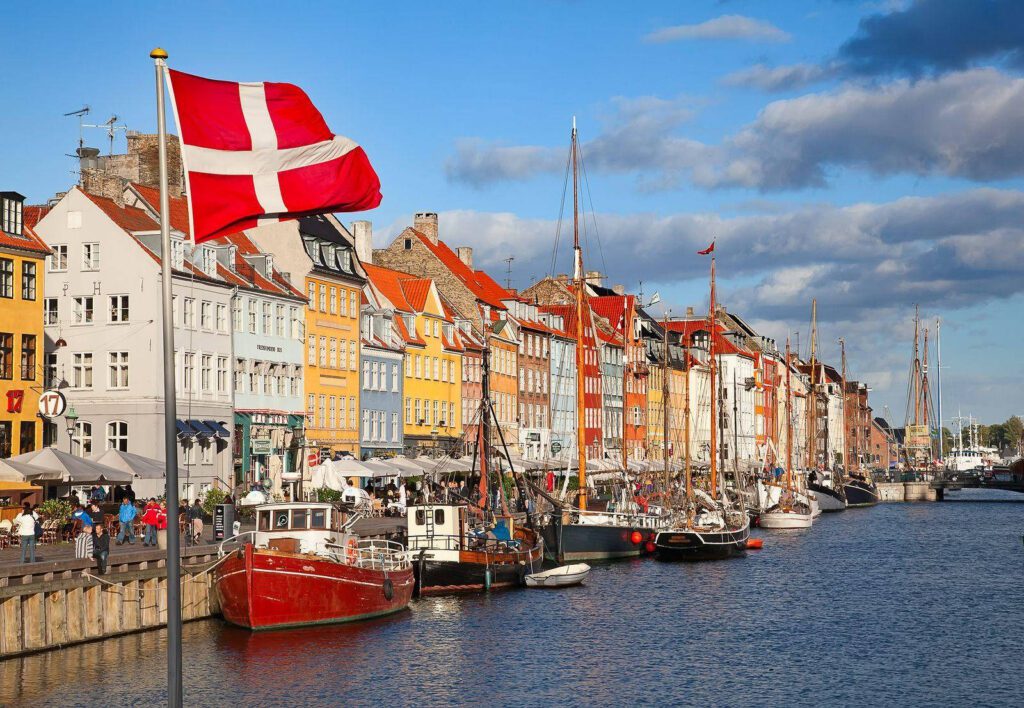Study In Denmark
Denmark – At a Glance
| Capital: | Copenhagen |
| Largest City: | Copenhagen |
| Major Cities: | Aarhus |
| National Language: | Danish |
| Ethnic Group: | Danish Greeks |
| Religion: | Christianity |
| Area (KM): | 42,933 |
| Population (Million): | 5.8m |
| Density (Per KM): | 135 |
| GDP (Billion Doller): | 370 |
| Currency: | Danish Krone |
| Time Zone (Like UTC +6:00): | 1 |
About Denmark?
Denmark also officially known as Kingdom of Denmark is Nordic country situated in the northern Europe. It has are of 42,924 km2 and a population of 5.8 million. Denmark has long history of territorial dispute as once it was a part of Unified kingdom of Denmark with Sweden and Norway. With one sovereign ruler in the Kalmar Union they control of Baltic during 8th century. However beginning of 17th century there was devastation wars with the Swedish Empire.
Modern Denmark is known to one of the most developed country in the world with a very high GDP and standard of living. Denmark is member of EU but has their own currency. They are also founding member of NATO, the Nordic Council, OECD, OSCE and the UN. Denmark has world one of highest percentage of education, health care, civil liberty democratic governance, equity and the lowest corruption in the world.


Career Counseling

University Selection

Admission

Accommodation

Visa Application Guide

Air Ticket Issue

Airport Pickup

Language Course

Living In Denmark
- A clean country
- A great social system that offers free education and free healthcare
- The food is fresh
- Friendly people and they speak amazing English
- Design and fashion
- Great coffee
- Incredible restaurants
- An active nation
Higher Education in Denmark
Denmark is one of the most popular international study destinations in Europe thanks to its low study costs, high-quality English-taught Master’s degrees and the innovative teaching methods. International students also choose Denmark due to its great standard of living and the large variety of study subjects available at Danish universities. Denmark boasts an advanced educational system with many world-class institutions.
At some 30 higher education institutions, you can find well over 500 English-taught study programs to choose from. Like many other countries, Denmark distinguishes between full research universities and more practice-oriented university colleges (elsewhere often known as “universities of applied sciences” or polytechnics). A locally special kind of institution are the business academies, which offer practice-oriented associates and Bachelor’s degrees in business-related fields.
Study in Denmark


Top-Rated Universities
The University of Copenhagen is ranked high amongst its fellow schools in Denmark. It boasts a high international student exchange rate with a myriad of courses from which students can choose. It’s also one of the largest centers for research and education in the Nordic countries.
The University of Southern Denmark also offers competitive study abroad programs for international students. Its application process is simple and it provides accommodation ideas for students moving to Denmark from abroad. The university enjoys welcoming exchange students and offers a number of courses in English.
Scholarships & Grants
The University of Copenhagen offers government scholarships for those traveling from China, Egypt, Israel, Japan, and Russia. It also offers other scholarships based on studies and origins. Many universities will offer scholarships, grants, and/or financial aid to help fund your education, though not all scholarships are available to international students. However, there are other ways to get scholarships which are unique to student’s goals.
Unique Social Life & Traditions
Students in Denmark are involved in more social interactions surrounding their studies. At the beginning of the year, students are placed into study groups which meet weekly to discuss readings and class work. There are also traditional events, such as Aarhus University’s “Kapsejlads,” which means Spring Regatta.
During this event, students gather around the lakes in the middle of campus for a day of drinking, relaxing, boat races, and a naked run to win tickets to the Roskilde Festival. Another tradition is Friday Bars, when different departments from the university host wild, themed parties. This brings more fun and variety throughout the school year and is a great opportunity to bond with your classmates.
Happiest Country in the World
Denmark was voted the happiest country in the world in April 2016, via the World Happiness Report. To rank the 156 surveyed countries, a team from the University of British Columbia looked at what the “countries have in common: a large GDP per capita, healthy life expectancy at birth, and a lack of corruption in leadership. But also essential were three things over which individual citizens have a bit more control: a sense of social support, freedom to make life choices, and a culture of generosity.”
Denmark’s results revealed a high percentage of gender equality and residents who love to bike. This contributes to the wellness of the people and the environment.
Exotic Food Culture
Another reason to study abroad in Denmark is to experience the country’s unique food culture. For breakfast, Danish folk will often have a dish called “junket crumble” or “ymerdrys.” It consists of crumbled rye bread mixed with brown sugar. Another morning dish students can experience as a study abroad student is “wienerbrød,” a Danish pastry filled with custard. Breakfast is usually the celebration time in Denmark, whereas dinner is the common American celebratory mealtime.
Wildlife & National Parks
Elk, boars, wolves, and brown bears frequent the terrains of Denmark. However, many other large mammals once found here have slowly gone extinct. The most common mammals seen include rodents like rabbits, hedgehogs, foxes, squirrels, and the European polecat. Roe deer are also common and roam the landscape freely. In the summer, many birds migrate to Denmark, such as water fowls, like the stork.
There are more than 300 bird species in the country all together. Marine life also flourishes within the mainland waters and in the North and Baltic seas bordering Denmark. A popular species is the beluga whale, which frequents colder waters. In order to protect the wildlife, three national parks were established in Denmark, and one was created in Greenland. They are open all year long and at no cost to visitors. The University of Copenhagen offers an incredible Animal Science program, which is taught in English. Many universities, like Copenhagen, offer work permits for international students.
Diverse Geography & Outdoor Activities
Denmark sits just above Germany and contains many islands around the mainland. Norway and Sweden are not too far off to the north, and may be an easy trip to take on a weekend. The lands are generally flat, but now low enough to have a lot of swampland. The coastlines are beautiful and the islands surrounding are densely populated.
The outdoor activities which can be found here are unique and fascinating to international students. Caving is a popular activity in Jutland, where three abandoned mines are now open to the public. Amber, or Nordic gold, hunting is common along the coastlines. Forest dinners, or what Americans would call “campfires,” are popular events. Mountain biking is available in many of the parks around Denmark and rentals are cheap. On the water, seal and porpoise watching is a huge tourist attraction.
Events & Festivals
The Ribe International Viking Market is a historic event that occurs each May. It showcases the way Vikings used to live hundreds of years ago. People from all over Scandinavia flock to Ribe to attend the events and historical shows held there.
The Aalborg Carnival is the largest carnival in Northern Europe, with over 60,000 participants and over 100,000 onlookers. Within the carnival is the Grand Parade, which ends in a large-scale party of colors in the city. It’s a unique event which happens right in the streets near Aalborg University!
Popular Landmarks
Denmark is a gold mine for students wishing to study history, anthropology, geography, the social sciences, and many more. It boasts an abundance of historical sites and museums, which showcase thousands of years of culture and tradition of the Nordic people. Rosenborg Castle in Copenhagen was built by the famous Scandinavian king, Christian IV, in the early 17th century.
It holds the crown jewels of the Danish king and queen as well as the portraits of Caroline Mathilde and Struensee. For those seeking contemporary thrills, The Tivoli Gardens is also situated in Copenhagen. It is one of the most popular amusement parks in Europe. It’s even said to be the base model for Disney Land. For Viking lovers, the Viking Ship Museum is located in Roskilde near the university. There you can book tickets to sail in a true Viking’s ship and experience how they traversed the waters with their incredibly advanced boats.
General Admission Requirements
Assessment of Students qualifications
Non-Danish citizens who do not have a Danish entrance examination are eligible for admission if they have qualifications recognized as being comparable to Danish entrance qualifications.
English language requirements
All higher education programs in Denmark require a high standard of English. Applicants to English-taught undergraduate and postgraduate programs must, as a minimum, prove English proficiency comparable to ‘English B’ in the Danish upper secondary school (gymnasium). Some programs require ‘English A’, which is one level higher than ‘English B’.
To prove a satisfactory proficiency in English, the language tests TOEFL, IELTS and Cambridge ESOL examinations (CAE) are often used. The score equivalents are determined by the individual institution, so to be certain check out their language requirements.
For information contact Faith Overseas Ltd.


